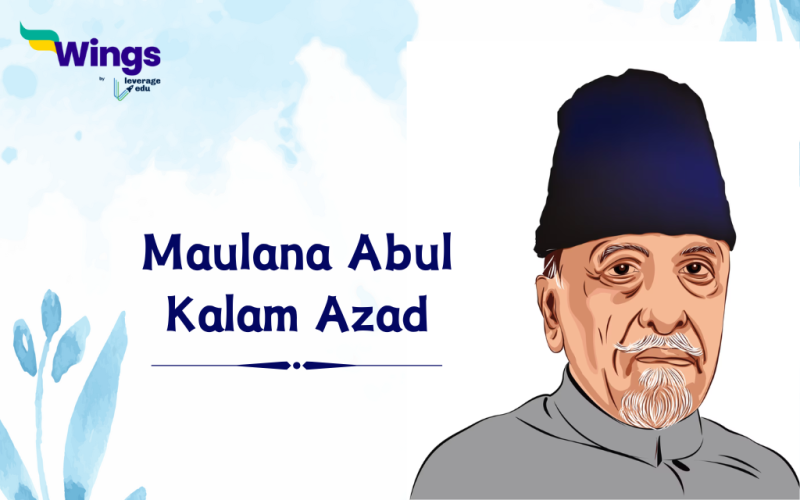Abul Kalam Ghulam Muhiyuddin Ahmed bin Khairuddin Al-Hussaini Azad, popularly known as Maulana Abul Kalam Azad, was an Indian independence activist, senior writer, and leader of the Indian National Congress. He also served as the First Minister of Education in the Indian Government. Read this blog to learn more about Maulana Abdul Kalam Azad and his life.
Table of Contents
| Overview Table Of Maulana Abul Kalam Azad | |
| Full Name | Abul Kalam Ghulam Muhiyuddin (given the title ‘Azad’ meaning ‘free’) |
| Life | Born: November 11, 1888 |
| Birthplace | Mecca, Saudi Arabia |
| Occupation | Scholar, journalist, writer, freedom fighter, educator |
| Known For | First Education Minister of Independent India |
| Leader in the Indian National Congress | |
| Champion of Hindu-Muslim unity | |
| Opposed Partition of India | |
| Early Life | Son of an Islamic scholar |
| Educated in Arabic and Persian literature at a young age | |
| Published a magazine at 12 | |
| Language Expertise | Urdu, Persian, Hindi, English, Bengali, and Arabic |
Early Life Of Maulana Kalam Abul Azad
Maulana Abul Kalam Azad’s early life was a fascinating blend of traditional Islamic education and a growing curiosity about the outside world.
- Maulana Abul Kalam Azad was born on November 11, 1888, as Abul Kalam Ghulam Muhiyuddin in Mecca, Saudi Arabia.
- He was the son of the famous Islamic scholar, Maulana Khairuddin.
- His mother was Arabic, and his family had roots in Afghanistan before they moved to Mecca.
- He received a traditional Islamic education at home from his father and other scholars, and learned Arabic and Persian first.
- He published his first magazine at the age of 12, known as Al-Hilal.
- He was influenced by the modernist ideas of Sir Syed Ahmed Khan, who advocated well for education and also talked about Western ideas.
Also read: The Eminent Musician Ustad Bismillah Khan
Maulana Abul Kalam Azad Contributions
Maulana Abul Kalam Azad was a multifaceted personality who influenced Indian history in a variety of ways –
Pre-Independence Contributions
- Maulana Abul Kalam Azad established the Urdu Weekly, Al- Hilal at a very young age.
- Through his work in Al-Hilal, he promoted Hindu-Muslim unity and Indian nationalism.
- He talks about the Indian freedom struggle in his autobiography, Indian Wins Freedom.
- Other notable works include Ghubar-e-Khatir (poetry collection) and Tazkirah (essays).
- He was a prominent figure in the Indian National Congress was several decades.
- He also became the youngest president of INC in 1923
- He opposed the partition of India and always talked about Hindu-Muslim unity.
- Advocated for non-violent resistance alongside Mahatma Gandhi but also supported mass movements like the Non-Cooperation Movement and the Quit India Movement.
- He faced imprisonment several times by the British for his work in the Indian Independence Movement.
Post Independence Contributions
- He served as the first Minister of Education of Independent India.
- Helped in the establishment of various Cultural institutions like Lalit Kala Akademi, Sahitya Akademi and Sangeet Natak Akademi to promote culture and heritage.
- Azad also emphasised the importance of inclusive education and secularism for nation-building.
Also read: Atmaram Pandurang: Life, Contributions and Achievements
Maulana Abul Kalam Azad Later Life and Work
The later life and works by Maulana Abul Kalam Azad are –
| Aspect | Description |
| Period | Post-Independence (1947 onwards) |
| Political Role | Stepped away from active politics after independence. |
| However, remained a respected figure and advisor to Prime Minister Jawaharlal Nehru. | |
| Focus | Education: Became the first Education Minister of independent India (1947-1958). |
| Played a key role in shaping India’s education system. Emphasized secularism and scientific temper. | |
| Established institutions like the Indian Institute of Technology (IIT). | |
| Other Contributions | Advocated for interfaith dialogue and cultural exchange. |
| Founded the Indian Council for Cultural Relations (ICCR) to promote cultural understanding between India and other countries. | |
| Legacy | Remembered as a scholar, writer, and freedom fighter. |
| His birthday is celebrated as National Education Day in India. | |
| Awarded the Bharat Ratna, India’s highest civilian honor (posthumously). |
FAQs
Maulana Azad is known for his leadership in the Indian National Congress, advocacy for Hindu-Muslim unity, opposition to partition, and role as India’s first Education Minister.
He excelled in Urdu, Persian, Hindi, English, Bengali, and Arabic, reflecting his deep linguistic knowledge.
Maulana Azad’s legacy includes his contributions as a freedom fighter, scholar, and India’s first Education Minister. He was honoured on his birthday as National Education Day and received the Bharat Ratna posthumously.
Relevant Blogs
If you want to know more about other Famous Personalities then visit our General Knowledge page!
 One app for all your study abroad needs
One app for all your study abroad needs













